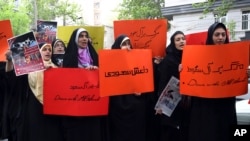As a war of words heats up between Iran and Saudi Arabia over the civil war in Syria and sectarian violence in Yemen, there are signs that even secular Iranians are joining in the anti-Saudi chorus. Their wrath has been provoked by reports on social media of two Iranian boys being assaulted by Saudi security guards at the Jeddah airport while on a pilgrimage to Mecca.
Iranians took to social media forums to denounce the Saudis after Iran’s foreign ministry briefed reporters about the incident. With national anger mounting, Iran suspended flights for pilgrims to Saudi Arabia in protest. The country’s “public honor has been tainted,” according to Iran’s minister of culture, Ali Jannati.
The assault in late March was confirmed publicly by Iranian officials on April 6.
Deputy Foreign Minister Hassan Ghashghavi said two Iranian teenagers who were “returning from umrah pilgrimage” were seized and forcibly made to undergo a body search by the guards. The minister claimed the assault was “similar to rape.”
The Iranian social media campaign denouncing the Saudis has gone viral and appears to be resonating widely in Iran among secular as well as religious groups. It is heightening tensions between the two regional rivals, who are backing opposing sides in the strife in Yemen as well as the civil war in Syria, which seeks to unseat Tehran’s ally, President Bashar al-Assad.
Iranian newspapers have devoted considerable space to the alleged rough handling of the teenagers, interviewing family members and quoting one of the fathers as saying, “This crime was not a crime against one person or a family, it was the crime of one government against another government.”
Rhetoric Heating Up
With national anger mounting, 70 Iranian lawmakers earlier this month demanded that the government suspend pilgrimage flights from Tehran until the safety of Iranian pilgrims can be guaranteed. Although the Saudis say they have arrested the guards involved, Iranians have organized loud protests outside the Saudi embassy in Tehran.
Protesters include members of the government-sponsored student Basij organizations and, according to local reporters, ordinary Iranians as well. The students have been waving the yellow flag of Lebanon’s radical Shia movement, Hezbollah, and denouncing the Saudi-led airstrikes on Houthi rebels in Yemen.
Iranian Shia clerics, who have alleged in the past that Iranians are harassed when on pilgrimage to the mainly Sunni Gulf kingdom, have been quick to take offense over the incident with the teenagers and to stoke public anger.
In a statement, Grand Ayatollah Naser Makarem Shirazi said he was loath to advise Iranians to boycott the pilgrimage, but questioned, “Should we continue at any price?”
He added, “They insult our clerics at the Prophet’s mosque and insult us at the airports. We should not be humiliated like this.”
The incident is getting greater play, say analysts, because of the war of words both countries are ratcheting up over their regional rivalry. Officials in Tehran and Riyadh accuse each other of empire building and stirring up regional unrest between Sunni and Shia Muslims.
The rhetorical war has become more venomous since the Saudis, with the support of Sunni Gulf neighbors, launched a military intervention last month in neighboring Yemen as Iranian-backed Houthi rebels, members of an offshoot Shia sect, threatened to capture the coastal port of Aden.
Tehran insists it is not playing a major role in Yemen, and accuses Riyadh of exaggerating its backing of the Houthis. But last week, U.S. State Department official Gerald Feierstein told lawmakers, “Iran provides financial support, weapons, training and intelligence to Houthis. We believe that Iran sees opportunities with the Houthis to expand its influence in Yemen and threaten Saudi and Gulf Arab interests.”
That also is the view of the Saudis.
But the Iranians argue they are the wronged party. Iran’s Supreme Leader Ayatollah Ali Khamenei has been joining in the war of words, arguing that since the death of Saudi Arabia’s King Abdullah a younger generation in Riyadh is pulling the strings.
Tweeting last week, he said, “Despite disputes, the Saudis used to display composure [with] us, but now inexperienced youngsters have come to power and replaced composure [with] barbarism.”
Risk of Confrontation
Some analysts say the Saudi intervention in Yemen has increased the risk of direct clashes erupting between the Saudis and Iranians. Their rivalry until now has been fought through proxies.
“The Saudi military intervention in Yemen since late March has all but raised the stakes to unprecedentedly dangerous levels,” warns analyst Alex Vatanka in a commentary piece for CNN. “Unlike in Syria and in Iraq, the Saudi military is now directly battling it out with Iranian-backed rebels in Yemen.”
Some Iranian hawks have called on restive Shia Muslims in eastern Saudi Arabia to rebel against the ruling House of Saud. And on Sunday, the commander of Iran’s ground forces, Ahmad Reza Bordestan, warned the war in Yemen threatens to spill into neighboring Saudi Arabia unless Riyadh halts its military intervention.
“There will be explosions in Saudi Arabia through rockets fired into its territory and the price of this [conflict] will be heavy for Saudi authorities,” Bordestan said in an interview with Iran’s state-owned Al-Alam TV.
But Tuesday, Saudi Arabia said it is stopping airstrikes in Yemen, and the conflict there will enter a new phase, focusing on the political process and helping civilians.
Iran calls the Saudi announcement a "step forward" towards a political settlement.




